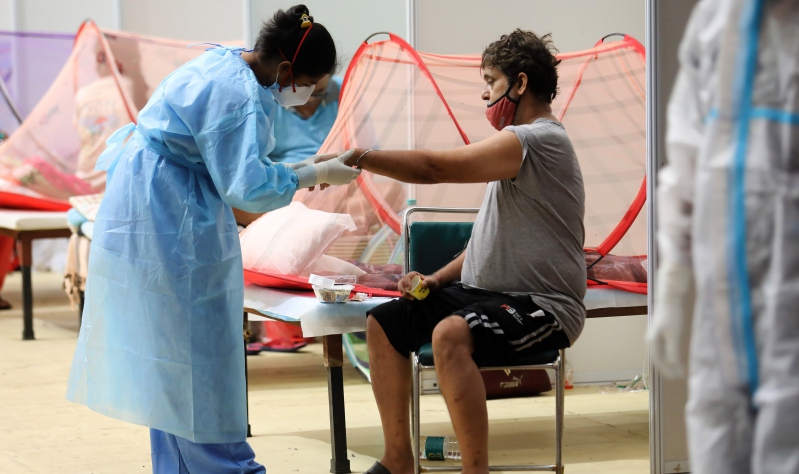
The Office of the Comptroller and Auditor General failed India during the coronavirus pandemic.
The COVID-19 pandemic has shaken the globe. The pandemic has been especially devastating in India, which on June 10 reported 6,148 COVID-19-related deaths, the world’s highest number of reported COVID-19-related deaths in a single day. The coronavirus is not the only plague impacting India as Transparency International India called government corruption a second pandemic. Corruption in India has limited the country’s ability to respond to the deadly COVID-19 crisis.
Corruption, along with a lack of good governance, has undermined the delivery of essential health care services that would protect the poor and disadvantaged. India lacks sufficient quantities of oxygen cylinders––the absence of which an Indian high court has called tantamount to “genocide”––and the country has a limited number of available hospital beds. And yet India’s supreme auditing institution has so far failed to complete a legal audit concerning these conditions.
The Office of the Comptroller and Auditor General (CAG) is an independent constitutional body that serves as India’s supreme auditing institution. B.R. Ambedkar—a famous political leader who campaigned against social discrimination through the caste system—said that the CAG is the most important office under the Constitution. Furthermore, the Indian Supreme Court held that the duties and powers conferred upon the CAG are a part of the “basic structure” of the Constitution.
Given its pivotal place within India’s governmental structure, the CAG would be best positioned to fulfill what the World Bank has emphasized as an important role for auditing institutions since the beginning of the COVID-19 pandemic.
In January of this year, the CAG did announce that the office would begin evaluating procurement and availability of drugs and paramedics, as well as review the vaccine distribution scheme for issues related to transparency. But with no report yet released, a meaningful and timely audit appears likely to be a chimerical dream.
Furthermore, the way in which CAG has initiated some of its work so far does not inspire confidence. In its review of the procurement of drugs and medical care, for example, the CAG has selected states to investigate in an arbitrary manner and failed to include some of the worst-hit states, including Delhi—India’s national capital territory—and Tamil Nadu—one of India’s most industrialized states. The CAG has so far also relied on field studies for its work, which risks the health of auditors and increases the amount of time to produce a report.
Although India’s parliament appointed the Public Account Committee (PAC) to review government expenditures, it cannot authorize its own audits. Only the CAG has the authority to conduct special audits. For the second time since the beginning of the pandemic, opposition members of the PAC have demanded that the CAG conduct a special audit of the vaccination distribution and exports, but the CAG has yet to meet their demand. A member of the ruling party in the PAC reportedly said that vaccination can only be audited once the budget allocated to it is exhausted. The World Bank, however, already rebutted this claim as it encourages real-time audits to make sure that good procurement practices continue.
In addition to the political factors that have complicated India’s COVID-19 response, lack of coordination between India’s central government and states has also hampered an effective response. Various instances during the pandemic, including the initiation of a vaccination drive for people ages 18 to 45, have highlighted the lack of coordination between the central government and the states. Fiscal centralization, however, only worsened this dynamic.
While state governments undertook essential public health measures and bore the economic impact of the lockdown, the central government provided almost no additional resources. Rather the central government imposed many conditions on the states’ ability to borrow. The central government’s policies limited the states’ ability to obtain COVID-19-related resources and resulted in increased economic distress. The miserable condition of rural India, where entire families are dying of COVID-19 because of the lack of medical facilities, demonstrates how the Indian government has mishandled its pandemic response.
Courts, however, cannot order the CAG to conduct a special audit. There have been various court orders summoning the government to answer for the non-availability of medical facilities and supplies in specific cases. For example, only after a case between the central government and Delhi went to the Indian Supreme Court could a court direct a special task force to audit the medical oxygen supply.
Compared to India, various other countries’ auditing institutions have done stellar work to respond to the pandemic. The Australian auditing agency conducts real-time audits and provides monthly reports to assist the government. It has also issued guidelines that reference historical examples of rapid implementation of Australian government initiatives.
The United Kingdom’s National Audit Office is carrying out accountability auditing such as overseeing vaccine distribution, ensuring availability of ventilators, and taking measures to protect businesses and individuals from the economic impact.
Brazil has reported that its Office of the Comptroller General has been cross-checking several federal government databases to detect problems and irregularities in allocation. The Brazilian audit so far has identified 680,564 public officials from the federal, state, and municipal governments who have unduly received economic benefits.
Finally, in the United States, the CARES Act included a provision for the Government Accountability Office to conduct monitoring and oversight of the use of funds made available for COVID-19 relief and to issue bimonthly reports on the pandemic’s impact.
The considerable public interest in the allocation of resources required to respond to the COVID-19 pandemic should have triggered prompt attention by India’s CAG. If not for its evasion of duty, non-partisan audit reports from an independent office could have helped restore the faith of millions of citizens in India and helped to save lives.




